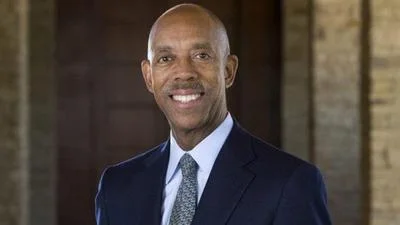Howard Gillman Chancellor | University Of California, Irvine
Howard Gillman Chancellor | University Of California, Irvine
UC Irvine has been designated as the new administrative headquarters for Cal-Bridge, a program aimed at increasing participation from underrepresented groups in California’s higher education systems and technology workforce. This transition marks the start of Cal-Bridge's second decade of service.
Cal-Bridge co-founder and executive director Alexander Rudolph moved from his faculty position at California State Polytechnic University, Pomona, to join UC Irvine's School of Physical Sciences over the summer break. He will continue to lead Cal-Bridge from UC Irvine, which has played a significant role in the program’s development.
“Of all of the University of California campuses, UC Irvine has been the most strongly engaged in Cal-Bridge,” Rudolph said. “Combined with involvement from UC Irvine’s Office of Inclusive Excellence and substantial backing and resources from the Department of Physics & Astronomy, Cal-Bridge flourished at UC Irvine and, as a result, more broadly in the UC and CSU systems. That’s one key reason why we decided to make Irvine the home of the program.”
Dean James Bullock expressed enthusiasm about this development: “One of the strategic goals of the School of Physical Sciences is to foster greater engagement in STEM fields, and Cal-Bridge has a proven track record of doing just that. We in the School of Physical Sciences are proud of our historical partnership with Cal-Bridge, and we’re delighted that the program now calls UC Irvine home. We look forward to working with the entire Cal-Bridge team in its efforts to strengthen and diversify California’s science and technology workforce.”
Cal-Bridge was initially established to help traditionally underrepresented students in California community colleges and CSU system advance to participating UC campuses for advanced degrees in physics and astronomy. The program now serves students studying physics, astronomy, computer science, computer engineering, math, and statistics.
With financial support from the National Science Foundation (NSF), Cal-Bridge began as a summer research initiative called CAMPARE in 2009. It officially launched as Cal-Bridge in 2014 with additional NSF funding. The program includes summer research opportunities, close mentoring by UC and CSU faculty members, financial aid, workshops for Ph.D. applications preparation.
In recent years, supported by state funding, Cal-Bridge has expanded its offerings to include Ph.D. fellowships, professional development workshops, cohort-building activities mentorship programs for postdoctoral scholars.
Rudolph highlighted that engagement and mentorship are critical drivers behind Cal-Bridge's success: “While other similar programs provide mentorship opportunities a few times a year or once or twice a semester,” he said. “Cal-Bridge mentors meet with our undergraduate scholars at least twice a month –and more frequently as needed.”
He also noted that workshops help students develop essential skills such as essay writing while fostering socio-emotional competencies necessary for Ph.D. success.
“There are now almost 350 scholars across the country at various stages,” Rudolph stated. "All those people support each other... there’s this huge community – many of them in California."
Financial assistance is another key benefit offered by Cal-Bridge allowing students more time dedicated towards study rather than work commitments: "We require our undergraduate scholars cut their outside work under ten hours week so they can focus on schoolwork maintain grade levels needed acceptance into Ph.D."
The move involved bringing Rudolph along small staff team from CSU/UC campuses better equipping him achieve main goal strengthening financial sustainability crediting Dean Bullock Tammy Smecker-Hane Kevork Abazajian Franklin Dollar their contributions towards relocation effort successful transition headquarters UCIrvine





 Alerts Sign-up
Alerts Sign-up